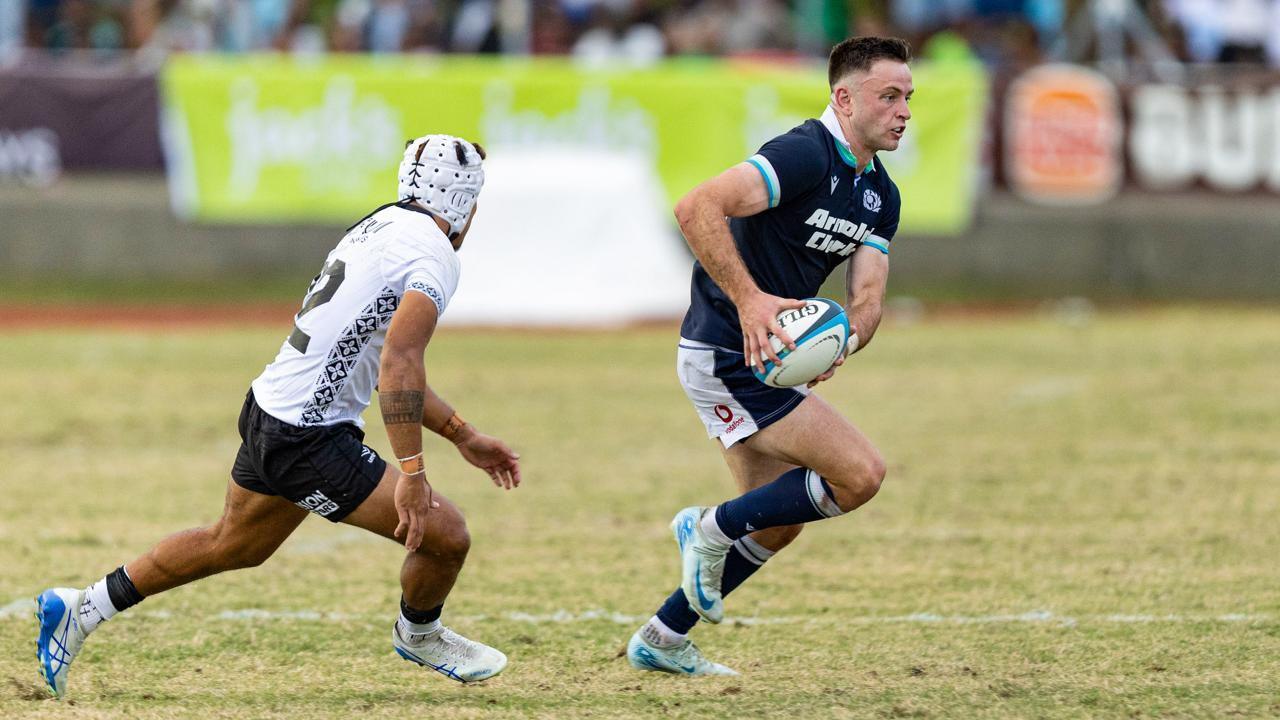Four things we learned from Scotland's loss to Fiji

Scotland are without eight top players, who are with the British & Irish Lions
- Published
Scotland suffered defeat in their second summer tour match as they were left battered, bruised and blown away by Fijian force and flair in Suva.
That was despite the return of star players like captain Rory Darge, back-row dynamo Jamie Ritchie and flying winger Darcy Graham.
Losing Test matches is never a good thing, but this result could have particularly grim consequences for Scotland's next World Cup campaign.
But what else did we learn from the humbling 29-14 defeat by Fiji?
Scotland suffer costly loss to Fiji in Suva
- Published12 July
Russell's role in earning White first Lions start
- Published10 July
AUNZ XV v Lions preview, teams and how to follow
- Published11 July
Scotland falter under Fijian intensity
Watching the Fijian runners take the ball into contact drew reactions akin to a horror film. Wincing, grimacing, hiding behind the sofa in sheer terror.
The Scots were brave at times, superhuman at others, but they could not handle the heat of the Fiji flair.
The visitors made 105 tackles in the first half but missed 24 - not surprising when the hosts have hot-stepping Jiuta Wainiqolo in their ranks, right enough.
Keeping up that kind of defensive effort, especially in that humidity, being run at by wrecking balls, seemed impossible and something had to give.
The brave should be remembered though. Darge led from the front, making a few Serge Betsen-esque tackles. Kyle Rowe and Fergus Burke did brilliantly to deny Josua Tuisova when it looked for all the world that he would score.
Matt Fagerson seemed to somehow be involved in every contact, picking himself up off the deck time and again.
However, when the whistle blew and bodies were strewn like litter in a park on a hot summer's day, you knew that it was a matter of time until the points started to flow.
Ill-discipline and poor restarts haunt Scots
The last six minutes of the first half really punished Scotland. It felt like they had had the ball in hand twice since they scored in the third minute - and the defensive effort started to toll.
The penalty count mounted up, although according to the statistics, Scotland had only conceded two more (seven) than their hosts by the break.
It felt like Ben O'Keeffe was constantly blowing his whistle for some infringement or other. Darge was told a few times to get his house in order, but it did not happen.
Instead, Fiji were allowed chance after chance to kick down the door and they did that with glee from any given distance on the pitch.
When Scotland did have possession, it was soon given away via a box kick or self-inflicted error. Restarts were fumbled, throw-ins went wayward and the ball was gifted back to the delighted hosts.
Chaos rules with gameplan under microscope
Watching Fiji play rugby is usually an enjoyable experience - except when it is happening against you.
They were at their free-flowing best at times in Suva, with the numbers on their back nothing more than a mere suggestion to the type of game they might play.
Silky offloads, bone-shaking contact, twinkle-toed footwork. Forward or back, tight-five or back-three, it does not matter.
The problem for Scotland was, they seemed to be quite happy to allow Fiji to play the game their own way. Too often they were given a clear run at a Scottish shoulder or allowed in behind.
The game was played to their strengths, while Scotland only fired two clear shots throughout.
As a result, Fergus Burke did not get much a chance to run his back line and Scotland's attack without Finn Russell is still much of an unknown.
If the plan was to pin Fiji back in their own half, it did not work as Scotland failed to put on pressure at set-piece time and let the hosts up the pitch far too easily.
World Cup 2027 already looks harder
When Gregor Townsend announced his Scotland squad, stacked with stars who might have warranted a summer off, his reasoning was clear.
The games against Fiji and Samoa were vital to secure important World Rugby rankings points ahead of the World Cup draw in December.
This was the penultimate chance before the autumn to pick up such points to try to secure a top-six place - and, in doing so, become a pot one team.
After a brutal and bruising match against Fiji, that now looks highly unlikely and another group of death awaits Scotland, akin to 2023.
It looks increasingly likely that Townsend will be there in Australia in two years time, but another group-stage exit would result in his reign being highlighted by failure.